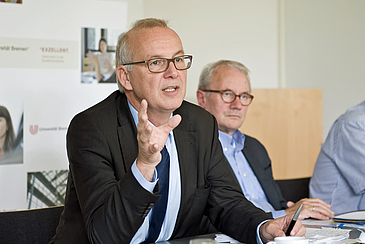What does Bremen want – a fully fledged university with a comprehensive offer of tertiary education, or a pint-sized technical college? This is the question that prompted the Rector, Prof. Bernd Scholz-Reiter, and the University’s Director of Finance and Administration, Dr. Martin Mehrtens, to invite media representatives to attend a press briefing at the University of Bremen. At the center of the briefing was the draft of Science Plan 2020 put forward by Bremen’s politicians, and the German Government’s move to assume the financing of student grants and funding for the Pact for Research and Innovation. Professor Bernd Scholz-Reiter expressed the view that it is "important for us that these funds are made available to the University".
Every euro accruing to the University is multiplied three times
Bremen’s agile research-oriented University of Excellence is indisputably an important economic factor for the whole region: The Rector pointed out that "Every euro the local government invests in the University is multiplied three times." The acquisition of third-party funds to finance research and the influx of newly recruited students translates into income for the State of Bremen – but the financial resources allocated to the University are marginal at best. Dr. Martin Mehrtens gave some examples to illustrate the catastrophic situation: Since 2010 the funding made available to professors for staffing, laboratories, and other resources has been cut from approximately 10,000 to just 6,000 euros – in other words, by about 40 percent. As a consequence of HEP 5 – the University's future development plan – since 2007 the number of professorships had to be drastically reduced. Now much of the teaching load falls to post-docs and lecturers instead of professors and their research associates. The resulting structure of instructional personnel is turning out to be more expensive than predicted.
Local government acts to deal with refurbishment backlog
A backlog has built up in respect of refurbishing the Universities laboratories and buildings, many of which date back to the 1970s and 1980s. A seven-digit figure is needed to refurbish and modernize the electrical and heating facilities and many roofs are in need of repair. "We are slowly coming to grips with the backlog and can see that the State of Bremen is doing its best to allocate the necessary additional funds", says Mehrtens. And the University is doing its part with lecture rooms being used to 90 percent of their capacity. "Something like 60 to 65 percent would be more typical for a university of our size."
"Some areas will have to be closed down"
In spite of the problems, the University management welcomes a number of the items contained in the new Science Plan. However, it has to be seen that the additional funds being made available will do little or nothing to alleviate the financial impasse. According to the Rector, "We will still have to make cuts of around ten percent in the years up to 2020". This cannot be achieved simply by trimming finances across all twelve Faculties. In this respect the University came up against its limits long ago. Scholz-Reiter pointed out that without topping up the finances foreseen in the Science Plan 2020 "some areas will have to be closed down". In the long run it might be better to gradually close down some areas in order that others can be resourced more appropriately. Whether this should affect the area of psychology or not is for the University governing bodies to decide. "That is not a matter to be decided on by the University management alone." Notwithstanding, Bernd Scholz-Reiter made no secret of the fact that psychology might well be a candidate for axing due to the age of the professors in that area. The only way to avoid this would be to provide the University with additional federal funds. All in all, the University is facing a budget deficit in the order of 16 million euros.
Strengthen the trust between the Federal Government and the individual states
"In the event that the federal funds should flow in another direction I fear that trust in the federal states will be affected." After all, it has to be seen that the federal Government is only relaxing the ban on cooperation in education affairs so that the freed-up funds will accrue to the universities. Scholz-Reiter stressed that "Our University is particularly strong in research. The question is, though, how long this can be maintained under such catastrophic financial constraints."

